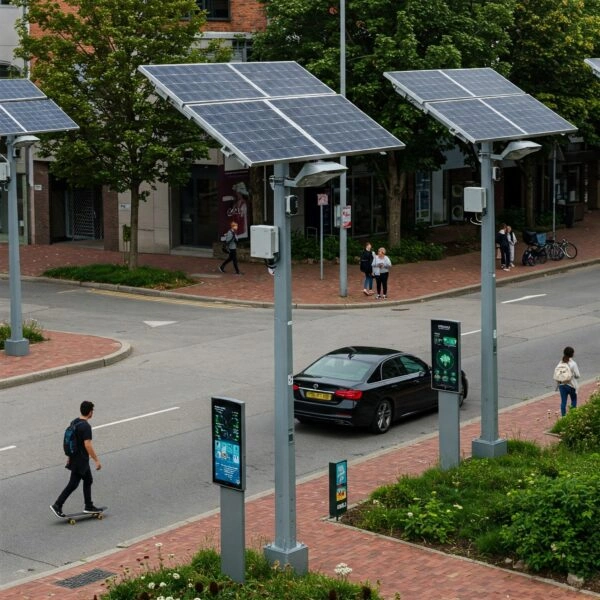
1. Executive Summary
This report outlines the top ten key benefits for global wholesale buyers adopting solar street lights equipped with remote control. These benefits include significant cost savings, superior operational efficiency, and broad market opportunities, making them a sustainable and efficient alternative to traditional lighting.
2. Introduction
The global demand for efficient and sustainable lighting is growing, and solar street lights are an ideal choice due to their energy independence and environmental benefits. The integration of remote control technology further enhances their functionality, offering significant market potential for wholesale buyers.

3. Technical Overview of Solar Street Lights with Remote Control
Solar street lights with remote control primarily consist of solar panels, batteries, LED luminaires, controllers, and remote control units. Key technical specifications include lumens, color temperature, battery capacity, solar panel power, waterproof rating, motion sensors, lighting modes, and remote control functions. They have a long lifespan, with LED lights typically lasting 50,000 to 100,000 hours.
4. Advantages of Solar Street Lights Over Traditional Lighting Systems
Solar street lights outperform traditional lighting systems in terms of cost, environment, maintenance, and installation. They are energy-saving, reduce infrastructure costs, utilize renewable energy, decrease carbon emissions and light pollution, are easy to install and maintain, and are more reliable during power outages.
5. Additional Benefits of Remote Control Functionality
Remote control enhances energy management (remote scheduling, dimming), improves monitoring and maintenance (remote diagnostics, simplified maintenance), increases safety and security (remote adjustment, integration with surveillance systems), and provides greater operational flexibility and customization (adjustable lighting modes, customizable settings).

6. Top Ten Benefits for Global Wholesale Buyers
- Significantly Reduced Long-Term Operating Costs.
- Enhanced Energy Efficiency and Optimization Through Remote Management.
- Simplified Installation Process and Reduced Labor Costs.
- Lower Maintenance Requirements and Remote Monitoring Capabilities.
- Contribution to Environmental Sustainability and Corporate Social Responsibility.
- Enhanced Public Safety and Security in Illuminated Areas.
- Reliable Performance and Independence from the Power Grid.
- Versatile Applications Across Different Geographies and Industries.
- Potential to Benefit from Government Incentives and Subsidies.
- Alignment with Growing Market Demand for Green Technologies.
7. Global Market Analysis and Case Studies
The global solar street light market is experiencing strong growth and is projected for continued rapid expansion. Wholesale prices are influenced by factors like raw material costs and market demand. Case studies show that smart solar street lights can significantly reduce energy consumption and maintenance costs while improving safety.
8. Versatile Applications Across Different Geographies and Industries
Solar street lights are suitable for various environments, including urban streets, rural roads, highways, parking lots, and industrial areas. Remote control functionality further enhances their adaptability.
9. Potential to Benefit from Government Incentives and Subsidies
Many countries and regions offer incentives for solar projects, such as tax credits and subsidies, lowering costs for end-users.
10. Alignment with Growing Market Demand for Green Technologies
Offering green technology products like solar street lights meets the market’s demand for sustainability and attracts environmentally conscious customers.

11. Recommendations for Global Wholesale Buyers
Wholesale buyers should focus on product quality, reliability, and technical specifications, and inquire with suppliers about certifications and after-sales service. Promotion should emphasize cost savings and environmental benefits.
12. Conclusion
Solar street lights with remote control offer significant economic and environmental advantages for global wholesale buyers and align with the market’s demand for sustainability. They will play a crucial role in future infrastructure development.



